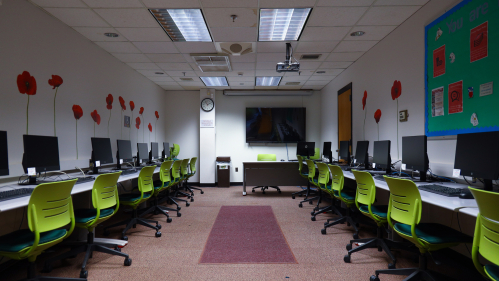Rutgers' Empty Computer Labs Put to Use Testing Possible COVID-19 Treatments

When COVID-19 forced students home, the university’s once-bustling computer labs fell silent, and more than 1,250 computers sat unused.
Now the computers are at work once again, helping researchers around the globe fight the very disease that displaced students across Rutgers locations.
Information technology professionals have connected the devices – and other machines from around the university – to a research consortium called Folding@Home, which will use them to predict the efficacy of potential COVID-19 treatments. Folding@Home pairs research labs that need extra computing power with people who want to put their machines to good use. Volunteers download an app that works in the background, automatically tapping unused resources for research.
Folding@Home normally supports research into many different diseases, but it has made news recently by turning its resources to the fight against the SARS CoV-2 virus that causes COVID-19. Other participants and partners include Colorado State, Google, Intel and the University of Virginia.
“The machines in the labs aren’t particularly powerful individually, but collectively, they have a huge amount of computing power that can do valuable work,” said Brian Luper, a director in the Office of Information Technology (OIT) who learned about the Folding@Home COVID-19 efforts from a tech blog post. Luper, who oversees many of the university’s computer labs, realized that the computers in the labs, though just regular Macs and PCs, were “a huge, untapped resource that could help test treatments” for COVID-19.
And Luper isn’t alone. The Office of Advanced Research Computing (OARC) is donating compute cycles from their high-performance computing systems to Folding@Home, which is also getting contributions from at least a dozen others with university email addresses. “Team Rutgers” at Folding@Home was recently ranked in the top 1 percent of all Folding@Home contributors.
How can computers evaluate COVID-19 treatments?
Drugs affect your body by binding to molecules inside you and changing their behavior. To find an effective COVID-19 treatment, you need to find (or build) a molecule that binds either to the virus or to some molecule in your body that interacts with the virus.
Molecules, like puzzle pieces, only bind if their shapes correspond properly, so researchers must first discover the exact shapes of molecules they wish to “target” and then find a drug with inversely shaped structures.
Unlike puzzle pieces, many molecules are extremely complex. A single protein can contain more than 10,000 atoms, all arranged into an unfathomably ornate shape that, to make matters worse, is constantly changing. Drug molecules can be equally complex.
Predicting “fits” can take trillions of calculations, and that’s where the computer lab’s machines can help.
“We already know the primary shape of the protein we’re targeting, so we’re now screening drug-like molecules to see which fit best,” said Vincent Voelz, an associate professor of chemistry at Temple University who is one of the leaders of the Folding@Home project. “We assign one potential drug to each computer, so the addition of 1,000 computers gives us 1,000 more chances to find a promising treatment.”
OIT operates more than 25 computer labs across the university, with some of the labs housing scores of computers. It would have taken weeks to install the Folding@Home software computer-by-computer, but Luper knew there was a shortcut: The software that normally pushes updates to computer labs would enable OIT to complete the process in just a few hours.
Luper’s request to connect the computer lab machines to Folding@Home won immediate and enthusiastic support from OIT leadership.
“I’m thrilled we are able to contribute our computing resources to the hunt for a cure,” said Michele Norin, senior vice president and chief information officer.
The leader of OARC echoed Norin’s thoughts. “Rutgers researchers are playing an important role in the fight against COVID-19, and I’m glad that OARC can aid this research by prioritizing COVID-19 related work on our high-performance computing resources,” said Barr von Oehsen, the associate vice president of OARC.
OARC has contributed time from various high-performance computing systems, including full-time work from a specific research “cluster,” known as Perceval, that has roughly 500 times the computing power of a normal Mac or PC.
As with the computer labs, which were only available to fight the virus because the virus had sent their normal users home, OARC’s Perceval cluster became available for COVID-19 research because COVID-19 forced OARC to postpone planned changes to the system.
“The Perceval cluster was due to be repurposed, but we were able to immediately connect it to Folding@Home when the pandemic sent us home,” said Ryan Novosielski, who is a senior technologist at OARC. “We won’t be able to repurpose the system until the pandemic has subsided and it’s safe to work on site.”
Want to help test potential COVID-19 treatments? You don’t need hundreds of computers or a research cluster to help Folding@Home do valuable research. Each additional computer helps, and it’s easy to download the software and configure it so that it won’t slow your computer down when you need to use it. You can also learn more about the Folding@Home effort to combat COVID-19.


